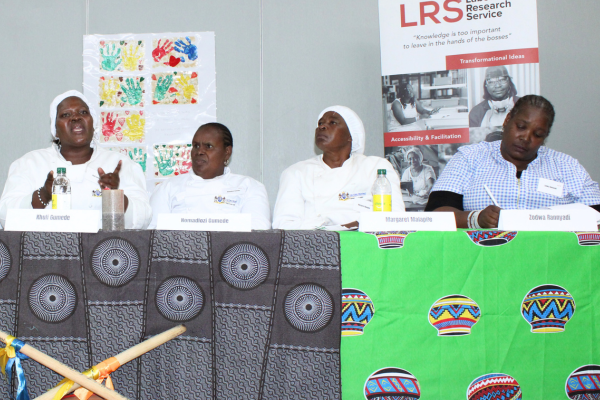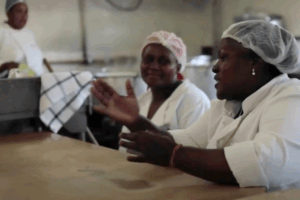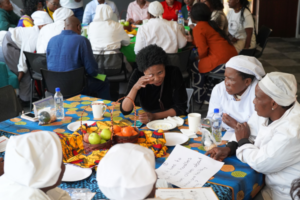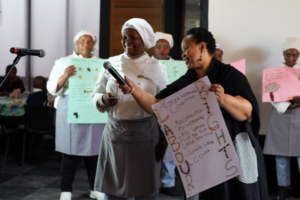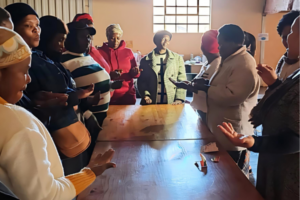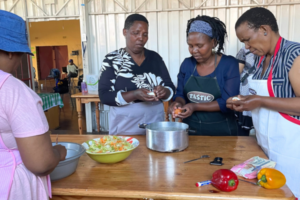Volunteer Food handlers shared personal stories and their challenges working under the National School Nutrition Programme (NSNP) at a media conference in 2023 in Johannesburg.
In his 2024 budget, Finance Minister Enoch Godongwana announced an additional R25.7 billion for the education sector, primarily for wage increases over the medium term. Notably, he made special reference to the National School Nutrition Programme (NSNP) and the fact that the government has been able to protect the budget of a critical programme that provides food to learners in more than 20,000 schools.
The NSNP is a government programme providing nutritious meals to learners in primary and secondary schools. It is located in the Social Sector of the Expanded Public Works Programme (EPWP). The Social Sector in turn is coordinated by the Department of Social Development and supported by the Departments of Basic Education and Health. The services offered by the social sector include the NSNP, Early Childhood Development, Home Community Based Care, and Community Crime Prevention.
Run by the Department of Basic Education, the NSNP plays a crucial role in addressing malnutrition and the increasing levels of food insecurity among learners. Through the programme, community members are employed as ‘’Volunteer Food Handlers” to prepare and serve meals to more than 9,6 million learners each school day. Schools participating in the NSNP contract a group of ‘’Volunteer Food Handlers’’ for two years.
Over 93% of the Volunteer Food Handlers in schools are women who are mothers or guardians of learners. They are still referred to as volunteers despite their crucial role in the National School Nutrition Programme since 1994.
The Volunteer Food Handlers spend up to six hours a day ensuring that learners receive two nutritious meals daily essential for combating hunger and malnutrition and supporting the healthy mental and physical development of learners so that they can concentrate and learn in the classroom. At a school level, they are the engine of the nutrition program, but even though the programme has been in existence since 1994, the women driving the program continue to be referred to as volunteers. Signing two-year contracts, paying UIF, and working up to six hours a day with defined job descriptions and responsibilities, has not changed the status of the Volunteer Food Handlers, they continue to be referred to and treated as volunteers and not employees of the Department of Basic Education.
More than 61,000 Volunteer Food Handlers are contracted to ensure learners receive the daily nourishment as prescribed by NSNP guidelines. The contracting of the Volunteer Food Handlers forms part of the EPWP provision of work opportunities for what is described as unemployed and unskilled people. The NSNP, alongside other social sector programmes, has been hailed by President Cyril Ramaphosa as an important initiative contributing to a care economy by creating work opportunities and extending social services to communities.
The International Labour Organisation defines the care economy as the “set of activities and relationships involved in meeting the health, social, and educational needs of people throughout the life course”. We all know that care is a very basic human need and the Covid 19 pandemic brought this home to us in a very real way. Our society functions because of the work of caring. As a society, the improvement in the well-being of people, communities and the planet needs to be at the heart of how we measure progress in human development and productivity. It is this recognition and valuing of care and the work of caring for others that we need to use when measuring the effectiveness of the Finance Minister’s budget pronouncements and like all other economic activities, we need to recognise that care work needs input of resources so that a production process can take place leading to an output of goods and services.
What kind of value are we placing on the care work being performed through the EPWP Social Sector?
Are we seeing it as essential to a sustainable economy? With women more than 90% of the people engaged in the NSNP and Early Childhood development programmes and close to 75% of the Homebased Care programme, there is a claim that the EPWP and more particularly the Social Sector of the EPWP is helping to alleviate women’s poverty and strengthening their participation in the labour market.
Even with these stated intentions, the women carrying out the crucial work of these programmes continue to be referred to as ‘’volunteers’’ or ‘’participants’’ and not as workers. One explanation for this is that the EPWP programme intends to create short-term work opportunities for unemployed and unskilled people and not permanent jobs. Yet the government claims that programmes like the NSNP, Early Childhood Development and Home-based care are essential for the wellbeing and functioning of society.
Is the lack of recognition and value for the care work performed by women in the social sector EPWP programmes stem from the fact that women are essentially carrying on with unpaid, unrecognised, and undervalued work similar to what they do at home?
Creating an economy that cares requires recognising and valuing the work of caregiving. Instead of viewing caregiving as a drain on fiscus, we should understand it as essential work that enables all other kinds of work to be possible.
Volunteer Food Handlers are regarded as unemployed and unskilled. Unemployed must not be confused with not working, as the women Volunteer Food Handlers work many hours a day in the home without any pay or recognition for their work. The notion of the unskilled also needs to be challenged. Volunteer Food Handlers have years of experience and accumulated knowledge of caring for and looking after family members of all ages.
Ironically, the women who are recruited as Volunteer Food Handlers are referred to as unskilled yet they are recruited to a ‘’crucial’’ programme like the NSNP where the nutritional and health needs of millions of learners are left in their hands. They are paid a stipend and not a wage and have the title of volunteer and not employee even though they are the engine of a crucial programme like the NSNP. The lack of recognition of the Volunteer Food Handlers as workers with decent pay and working conditions questions any commitment the Government might claim to have in support of an economy that cares and values the work of care workers.
Creating an economy that cares requires recognising and valuing the work of caregiving. Instead of viewing caregiving as a drain on fiscus, we should understand it as essential work that enables all other kinds of work to be possible. The projected allocation for the NSNP in the 2024/25 budget is around R9.3 billion [Source: Medium Term Expenditure Framework] for the provision of meals to the 9.6 million learners, stipends to more than 61 000 VFH and payments to approximately 3 500 small and medium enterprises and local cooperatives contracted to supply food to learners. Usually, our first response to budget allocations is that the amount allocated is not enough. In the case of the NSNP, this is true if one looks at the very low monthly stipend of R1 712 that most Volunteer Food Handlers’ provincial contracts stipulate for a ‘’work opportunity’’ of up to 6 hours per day, 5 days a week.
One key intention of the EPWP is to provide participants with a work opportunity that builds the skills base of participants preparing them to access work opportunities and entrepreneurial initiatives. So while the NSNP is being hailed as a successful intervention in addressing challenges like hunger and malnutrition, another important criterion for assessing the success of the NSNP is the kind of change it is making in the lives of the women responsible for preparing the nutritious meals served to learners.
The work of care involves the production of a service and the Volunteer Food Handlers are the heart and hands of the NSNP.
Challenging the title ‘volunteer’
Our very own Code of Good Practice defines who an employee is and the Volunteer Food Handlers meet these definitions by having their work and hours of work directly under the control of another person in this case the School management and Department of Education.
Volunteer Food Handlers sign contracts with heavily regulated duties. They have to act by a Code of Conduct and are carefully supervised and expected to carry out instructions. Volunteer Food Handlers work anything from 100 to 120 hours per month for 24 months, way above the 40 hours and 3 months minimum prescribed in the Code of Good Practice.
Yet even with all of these conditions in place, the work of women Volunteer Food Handlers is still called ‘’voluntary’’. The only conclusion one can reach is that the State continues to see the work women do as not being real or productive work but rather an extension of the role that society prescribes for women. This flies in the face of any claim that the programme intends to empower women.
What we are witnessing is a deepening of the exploitation of the work women do and an entrenchment of the notion that women should feel grateful for getting a stipend for the work they do.
Compliance and contract disparities
Lack of compliance to legally prescribed workplace conditions is indicative of a lack of value and subsequently the lack of interest, respect and recognition of the important role of the Volunteer Food Handlers.
At the moment stipends for Volunteer Food Handlers are pegged against the EPWP National Minimum Wage of R15,16 per hour and conditions of work against the EPWP Ministerial Determination. Yet Volunteer Food Handlers across the different provinces sign contracts where there is no uniformity in the stipend allocation or conditions of service.
At the end of their two-year contracts, many Volunteer Food Handlers struggle to access their UIF and can spend months trying to claim what is rightfully theirs. A Department of Public Works and Infrastructure evaluation of the EPWP programmes speak of the lack of uniformity in the application of prescribed standards leading to ‘’misinterpretations, manipulations, inertia and abuse, resulting in a lack of enforcement and compliance.
For the woman working as a Volunteer Food Handler, there is the hope that the two-year contract will strengthen her care work skills and knowledge and open spaces for her to create future employment and learning opportunities. When she is treated as an unskilled, unemployed woman who should be grateful for getting an opportunity to earn a small stipend for volunteering the opportunity for empowerment and growth is being crushed.
Recognising and valuing care work is not a line item in the National budget, yet it is the bedrock on which all other economic activities depend. Recognising the Volunteer Food Handlers as workers with the right to decent work is an important starting point if we are to build a society that gives real recognition to care work.
RELATED ARTICLES
Building a campaign to recognise and value the work of Volunteer Food Handlers
Access Granted – Volunteer Food Handlers secure UIF benefits in a successful campaign

